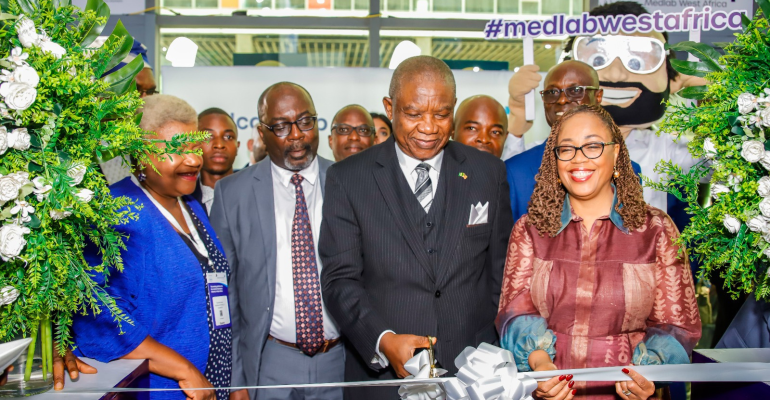The first-of-its-kind event dedicated to the laboratory sector in West Africa — Medlab West Africa — commenced with a captivating opening ceremony led by Mazi Sam Ohuabunwa FPSN, founder and former CEO of Neimeth International Pharmaceuticals Plc. and esteemed past President of the Pharmaceutical Society of Nigeria.
This was followed by an enlightening opening remark delivered by Dr. Donald Ibe Ofili, Director, and Deputy Registrar, MLSCN Accreditation Service, Medical Laboratory Science Council of Nigeria and Chair, West Africa Regional Technical Working Group on Biosafety and Biosecurity, Nigeria, who emphasised the importance of advancing standards within laboratory practices across the West African region. He urged for a transformation in medical laboratory services, leaving "no stone unturned" to improve healthcare in the region.
In a panel session on Equitable Access to Quality Diagnostic Testing in Communities, Oyebimpe Balogun, who is the Technical Advisor of Laboratory Systems at the UK Health Security Agency (UKHSA) in Abuja, highlighted disparities between urban and rural areas, stressing the importance of infrastructure and trained personnel for quality testing. She highlighted the importance of functional infrastructure and trained personnel to ensure quality testing in primary healthcare centers and other community healthcare facilities.
“Starting from the primary health centre to general hospital, to teaching hospital, to research laboratory, wherever it is going to come from, we need to build the reliability of our testing. So, we need to ensure that quality actually is driven from the bottom of our system," she urged.
Emeka Elom, Director and Head of Medical Laboratory Services: National Tuberculosis, Leprosy & Buruli Ulcer Control Programme at the Department of Public Health, Federal Ministry of Health, Nigeria, emphasised leadership capacity to ensure access to testing, advocating for incentives to retain healthcare workers locally. He advocated for safety nets to support workers, especially in underserved areas. Additionally, he pinpointed the importance of utilising data for decision-making and policy influence citing its role in securing funding and addressing healthcare challenges. He also revealed that these issues and solutions are very aligned with the presidential four-point agenda, in which priorities include measuring individual workers and patient needs, offering non-monetary incentives to the workforce, promoting integration, and leveraging data for informed policymaking.
The panel ‘Medical Laboratory Services in the Era of Artificial Intelligence’, Nonye Umahi, Managing Consultant and Founder of Cuanu Consult Ltd, addressed concerns regarding AI in healthcare, highlighting the need for ethical frameworks and regulation.
“Concerns are arising about healthcare professionals' familiarity with AI and their handling of patient data. The absence of regulation and ethical standards poses risks, notably with the surge of health apps developed by individuals lacking ethics understanding. Despite hurdles, I am hopeful about finding solutions to address these challenges,” she remarked.
Dr. Aliu Israel, Director Laboratory Service at Nizamiye Hospital Abuja, discussed AI's potential benefits and ethical considerations, urging the prioritisation of ethical standards in laboratory practices amidst technological advancements. Furthermore, the discussion extended to AI's transformative potential in enhancing the accuracy and efficiency of medical diagnostics. He urged healthcare professionals to embrace the potential of AI while upholding ethical standards and prioritising patient care.
In conclusion, panel moderator Kenneth Okolie, CEO of Synlab, stressed the importance of embracing technology, urging proactive learning and adaptation to ensure relevance in evolving fields driven by technological advancements. He reflected on personal experiences, highlighting the need to take ownership of learning and adapting to technological changes. He also stressed the necessity of understanding and effectively using technology in fields like medical science and pathology.
Opportunities and challenges posed by AI in healthcare were also a hot topic, which shed light on the need for ethical standards and continuous skill development. “So, AI is not going to take away anybody's job. What you are doing today may not be obsolete in the next five to 10 years but if you do not upgrade, if you don't improve it, machines will do it better,” he said.
Besides having exhibition booths of over 150-plus companies, Medlab West Africa also hosted a technical workshop on Counterfeit Pharmaceuticals organised by Pharmaconex aiming to combat the trend in Africa.
Professor M. A. Muhibi, Professor of Haematology with Edo State University, Uzairue, led the Haematology and Blood Transfusion Conference, which was then followed by a related panel session on emerging technologies featuring renowned health leaders Dr. Obaze Yetunde, Ademosun Abdul Waheed, and Dr. Donald I. Ofili, discussing advancements and safety measures in the field.
Missed the chance to attend this year? Register for Medlab West Africa 2025 for free and gain exclusive access to the region's biggest healthcare industry event.






